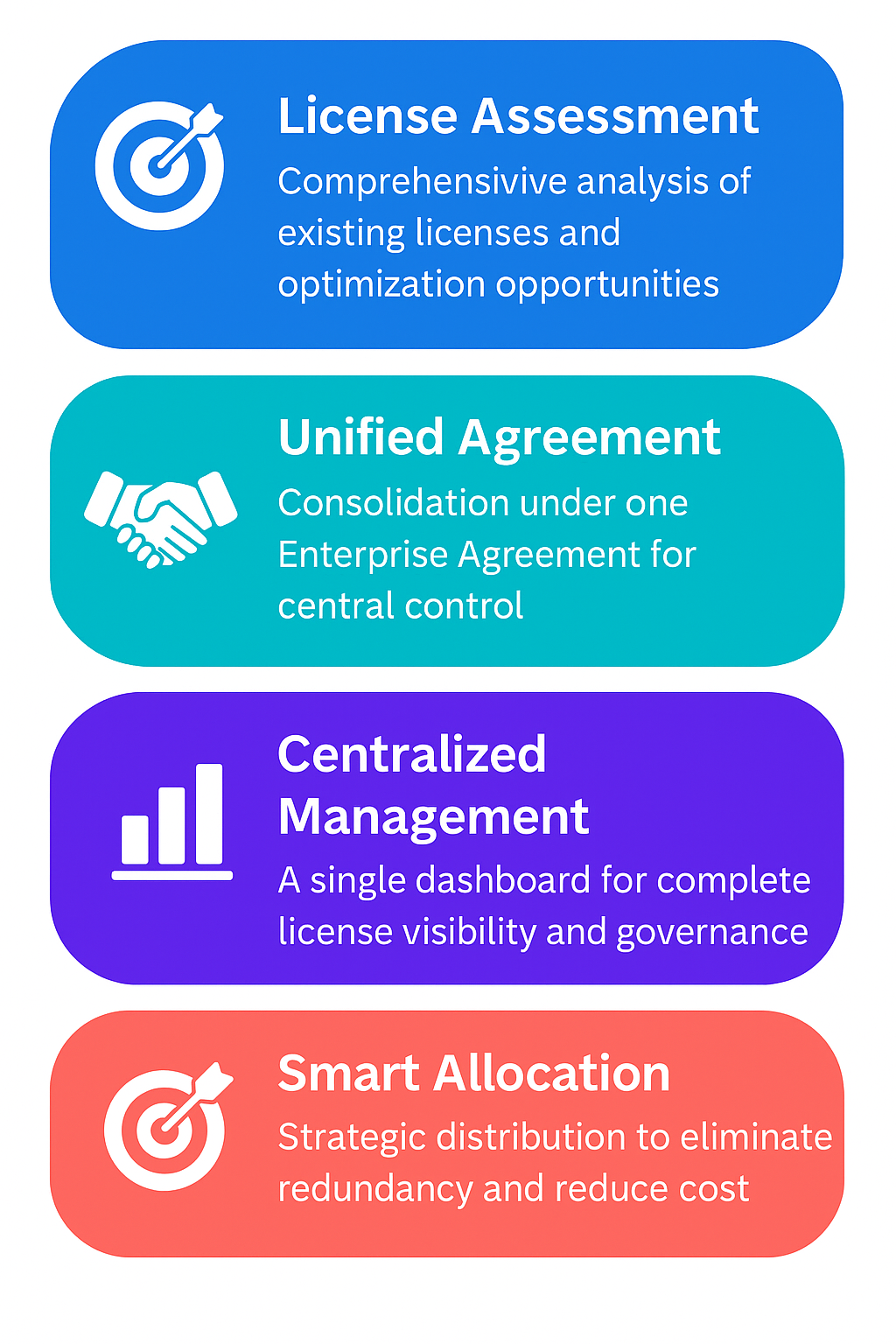Enterprise License Management Challenges for Saudi Businesses
Enterprise License Management has become a critical priority for Saudi business groups facing challenges with fragmented digital infrastructure. As organizations expand, fragmented IT licensing structures disrupt business processes, create compliance risks, and generate unnecessary costs. This fragmentation hinders continuous improvement and digital transformation initiatives.
Dallah Group’s experience perfectly illustrates this challenge. As a diverse Saudi business group with multiple subsidiaries operating across various industries, each maintained independent IT environments with separate Microsoft tenants. This decentralized approach created significant operational inefficiencies that resonated with many Saudi business leaders responsible for digital oversight and mitigating risks.
The Strategic Value of Enterprise License Management
When business units operate with separate Microsoft tenants and licensing agreements, the consequences extend beyond administrative inconvenience:
Financial Inefficiencies
Without consolidated enterprise license management, organizations frequently over purchase licenses while underutilizing resources elsewhere. Dallah Group found themselves unable to transfer licenses between subsidiaries, leading to redundant spending on products and services. This represented capital that could otherwise fund machine learning, automation tools, or customer service improvements.
Administrative Burden
Enterprise license procurement, renewal, and management across independent business units demands significant resources. Dallah’s IT teams spend valuable time navigating different terms and conditions instead of focusing on ways to streamline processes. Each agreement required separate negotiation, making informed decisions about technology investments nearly impossible.
Compliance Risks
Fragmented enterprise license management increased Dallah Group’s compliance vulnerabilities. Without centralized visibility to continuously monitor usage, they struggled to ensure compliance with software deployment regulations. This exposure created potential data breach risks, compliance audit vulnerabilities, and reputational damage concerns.
Limited Collaboration
Most critically, independent licensing structures reinforced operational silos between Dallah’s business units. Teams couldn’t easily share software resources across organizational boundaries, creating technical barriers to knowledge sharing and unified business operational culture at a large scale.
How Enterprise License Management Transforms Operations
The implementation of a Microsoft Enterprise Agreement (EA) represented a paradigm shift for Dallah Group. Working with Alnafitha IT as their Microsoft partner, they recognized this was an opportunity for streamlining business processes that delivers multiple benefits:
License Usage & Cost Optimization
By pooling enterprise licenses across business units under a single agreement, Dallah gained the flexibility to allocate resources based on actual business needs. As their IT Management team reported: “This dynamic allocation ensures that expensive products and services don’t sit unused in one department while another team lacks necessary tools.” The result was significant cost optimization with improved user experience and return on software investment.
Streamlined Procurement
Consolidating multiple licensing agreements into a single Enterprise Agreement dramatically improved Dallah’s procurement processes. Instead of managing numerous vendors and contracts, they dealt with one comprehensive set of terms and conditions. This reduced administrative burden allowed IT teams to focus on implementing automation tools and continuous improvement initiatives.
Enhanced Visibility
The unified Enterprise Agreement provided Dallah Group with unprecedented visibility into software deployment across the organization at a large scale. As noted in their case study, “Centralizing license management resulted in greater visibility and control over licensing activities,” enabling informed decisions about future information technology investments.
Strengthened Compliance
Centralized enterprise license management significantly reduced Dallah’s compliance risks by providing a single source of truth for all software deployments. They could continuously monitor usage and easily generate accurate reports, ensuring compliance with vendor agreements and regulatory requirements while mitigating risks of penalties.
Improved Collaboration
Perhaps most valuable was how the unified licensing approach removed technical barriers to collaboration between Dallah’s business units. The case study specifically highlighted that “using the Enterprise Agreement facilitated collaboration and info-sharing inside the Dallah Group. Companies could exploit one other’s licenses using a shared licensing framework, boosting cross-functional collaboration.”
Enterprise License Management Implementation – Alnafitha Approach
Alnafitha IT’s methodology ensured Dallah Group realized the full strategic value of enterprise license consolidation:

Comprehensive License Assessment
The journey began with a thorough license assessment of existing arrangements across all business units. As stated in the case study, “Alnafitha IT team conducted an in-depth analysis of each company’s licensing requirements, agreements, and usage patterns.” This systematic license assessment identified redundancies and cost optimization opportunities that might otherwise remain hidden.
Customized Architecture
Rather than applying a one-size-fits-all template, Alnafitha designed a licensing structure tailored to Dallah Group’s unique operational model. The case study notes they succeeded in “harmonizing license types, subscription models, and renewal cycles, ensuring consistency and transparency across the board.”
Seamless Implementation
Transitioning from fragmented licensing required careful planning to avoid business disruption. Alnafitha’s implementation teams coordinated the migration process, ensuring users maintained uninterrupted access to critical applications and services while protecting user experience during transition.
Capability Building
Beyond the technical solution, Alnafitha focused on building internal capabilities within Dallah Group. The implementation included “a robust license management system that provided a centralized repository for license information, usage data, and compliance tracking.” This capability building supported a culture of continuous improvement.
Measurable Business Outcomes
The transformation achieved through Alnafitha IT’s Enterprise Agreement implementation at Dallah Group delivered significant business outcomes:
Cost Optimization & Reduction
By eliminating redundant licenses and optimizing allocation across business units, Dallah Group achieved significant cost optimization. The case study confirmed this: “Time, effort, and resource savings, enabling a focus on strategic initiatives.” These cost reduction benefits represented capital that could be redirected toward business growth and innovation, demonstrating the financial impact of strategic license management.
Operational Efficiency
The streamlined procurement and management processes dramatically reduced administrative burden. Staff previously managing fragmented licensing were redeployed to higher-value activities. As the case study stated: “Simplification of the procurement process” was a key benefit that accelerated technology adoption across the organization.
Compliance Management
The centralized licensing framework established effective compliance management across all business units. The case study emphasized that their new approach “facilitated accurate tracking of licenses, ensuring adherence to regulatory requirements. Consequently, this reduced the risk of non-compliance and potential legal and financial implications.” This robust compliance management system provided peace of mind to executives concerned about regulatory exposure.
Cross-Subsidiary Collaboration
Most importantly, the unified licensing approach removed barriers to cross-subsidiary collaboration between Dallah’s business units. The case study concluded that “Companies could exploit one other’s licenses using a shared licensing framework, boosting cross-functional collaboration, and maximizing the utilization of existing resources.” This enhanced cross-subsidiary collaboration created significant business value beyond the direct licensing benefits.
A Strategic Imperative
For Saudi business groups navigating digital transformation, consolidating fragmented enterprise license arrangements represents a strategic imperative for continuous improvement. Dallah Group’s experience demonstrates how partnerships with specialized providers like Alnafitha IT transform license management from overhead into strategic advantage supporting core business processes.
Conclusion
Dallah’s case study conclusion powerfully summarizes the impact: “Combining licenses for several tenants under a single EA was a game-changer. Dallah Group could boost operational effectiveness, cut costs, and improve compliance by centralizing the management and streamlining the licensing process.”
As Saudi organizations continue expanding digital capabilities, those implementing unified enterprise license frameworks gain significant advantages in operational efficiency, cost reduction, compliance assurance, and cross-unit collaboration. These advantages translate directly to improved customer service, more informed decisions, and sustainable competitive edge through optimized information technology management.
Take the first step today!
Contact Alnafitha IT for a comprehensive license assessment that will identify immediate cost-saving opportunities and long-term strategic benefits for your organization.
